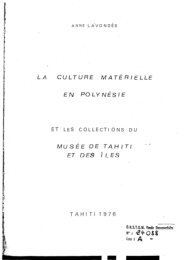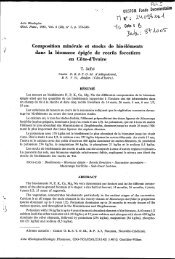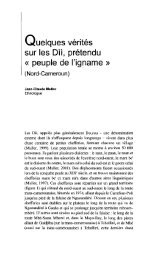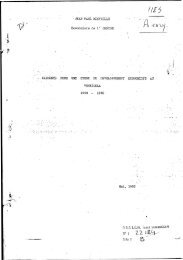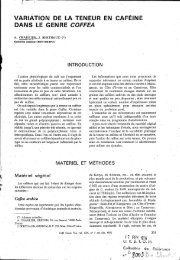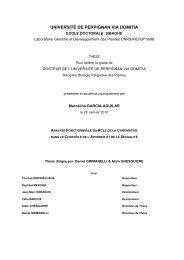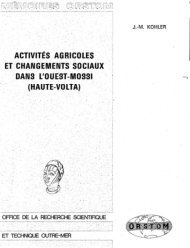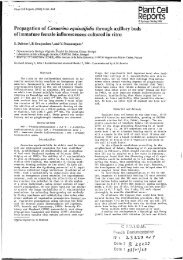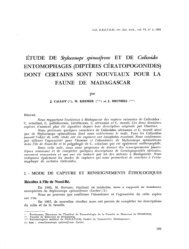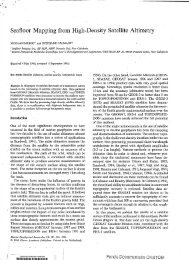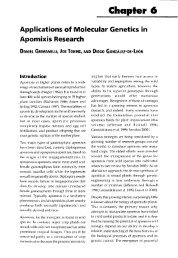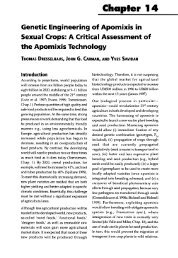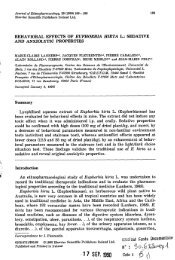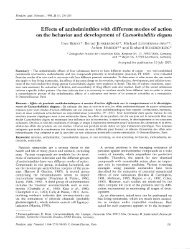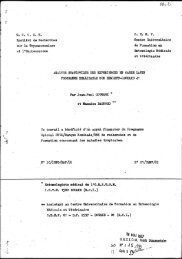A study case on coffee (Coffea arabica): Limu Coffe - IRD
A study case on coffee (Coffea arabica): Limu Coffe - IRD
A study case on coffee (Coffea arabica): Limu Coffe - IRD
You also want an ePaper? Increase the reach of your titles
YUMPU automatically turns print PDFs into web optimized ePapers that Google loves.
Exporters<br />
<strong>Coffe</strong>e exporter means a pers<strong>on</strong> who, up<strong>on</strong> being licensed to trade <strong>coffee</strong> by the<br />
appropriate government organ and fulfilling the requirements set by the Ministry, and up<strong>on</strong><br />
purchasing <strong>coffee</strong> from the Ethiopia Commodity Exchange or collecting from his own farm,<br />
prepares, processes and exports <strong>coffee</strong> in compliance with the export quality and standards<br />
[…] Any exporter shall have the c<strong>on</strong>tract and the correct sale price registered at the Nati<strong>on</strong>al<br />
Bank of Ethiopia not exceeding 24 hours after the c<strong>on</strong>clusi<strong>on</strong> of a c<strong>on</strong>tract for sale of <strong>coffee</strong>,<br />
and notify the same to the Ministry and other c<strong>on</strong>cerned authorities within 15 days […] shall<br />
export <strong>coffee</strong> before the next harvest […] shall except in <str<strong>on</strong>g>case</str<strong>on</strong>g>s of mixing processes registered<br />
under special permissi<strong>on</strong> of the Ministry, export <strong>coffee</strong>, without mixing different types and<br />
maintaining the name of place of origin […] shall sell <strong>coffee</strong> by product leftover from export<br />
<strong>coffee</strong> in the aucti<strong>on</strong> centres or the Ethiopia Commodity Exchange […] shall not resubmit for<br />
sale to aucti<strong>on</strong> centres or to the Ethiopia Commodity Exchange <strong>on</strong>ce he purchased the export<br />
<strong>coffee</strong> from the aucti<strong>on</strong> centre or from the Ethiopia Commodity Exchange and graded by the<br />
<strong>coffee</strong> quality liquoring and inspecti<strong>on</strong> centre.<br />
Exporters must be Ethiopian nati<strong>on</strong>als and are not allowed to cup taste the <strong>coffee</strong><br />
before buying it at the aucti<strong>on</strong> (Stellmacher, 2007). Since the 2008 proclamati<strong>on</strong>, exporters<br />
had to change their former license by the new export certificate of competence and a lot of<br />
them bought lands to own their <strong>coffee</strong> trees or became PLC members. This to keep exporting<br />
their localized <strong>coffee</strong>s and to c<strong>on</strong>trol their certificati<strong>on</strong> tools in some <str<strong>on</strong>g>case</str<strong>on</strong>g>s 78<br />
. Since producers<br />
became potential exporters, former exporters willing to keep <strong>on</strong> exporting specific <strong>coffee</strong>s had<br />
to turn into producers too.<br />
The government seized 17,000 t<strong>on</strong>nes of <strong>coffee</strong> in March 2009 and revoked the<br />
licenses of six exporters it put in jail and accused of hoarding their stocks and waiting for<br />
prices to rise. These exporters were the biggest <strong>on</strong>es, ensuring 40% of nati<strong>on</strong>al export last<br />
year, of which the famous Mulugeta, Nestlé supplier, who went to jail. This fed and still feed<br />
the current <strong>coffee</strong> polemic. <strong>Coffe</strong>e accounting for 60% of Ethiopian’s foreign exchange<br />
revenue in 2007/2008 earned more than $525 milli<strong>on</strong> from exports of 170,888 t<strong>on</strong>nes. ECX<br />
78 Refer 6.1.2) The August 2008 value chain changes’ principal loser: the Specialty Market<br />
85



